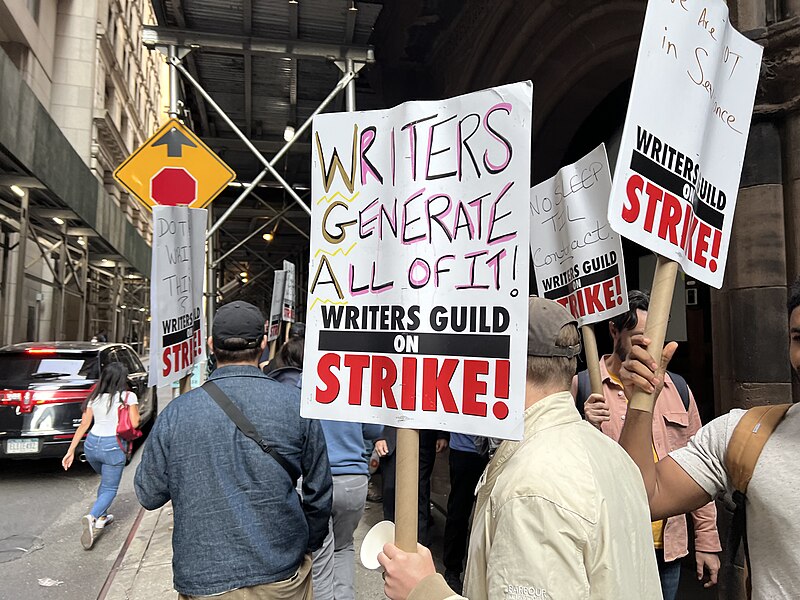Since May 2nd 2023, the screenwriters of the Writer’s Guild of America (WGA) have been unable to reach a labor agreement with film industry executives. Without a stockpile of pre-written episodes, late-night shows and comedies like “SNL,” “The Daily Show,” “Jimmy Kimmel” and “Stephen Colbert” left the air quickly. The general public is starting to see larger repercussions of the strike. Production for our favorite record-breaking shows–think “Euphoria”, “Stranger Things”–is now on indefinite hold.
Why does precious television have to suffer as a result of the writer’s strike? Simply put by WGA board member and writer Adam Conover, they are fighting for “the survival of television and film writing as a sustainable career.”
Consumption (and revenue) of television has skyrocketed due to the rise of accessible streaming platforms like Netflix, Hulu and Amazon Prime Video. However, pay received by writers has stagnated or decreased despite this unforeseen profit.
The streaming business works by making screenwriters exclusive by contract to a studio for several weeks or a couple of months writing on a show, leaving them effectively unemployed for the remainder of the year. During the time between each season or project, writers must live off of residuals (checks they get based on their work’s post-release success) often lower than pennies on the dollar according to The Washington Post.
The profit created by writers instead lines the pockets of company CEOs, intentionally turning screenwriting into a gig-based career. Do not be fooled into believing that writers aren’t deserving of their profits. This is a common capitalist scheme to keep workers dispensable by any possible means. Without job security, more writers–even showrunners of “cash-cow” shows–won’t qualify for healthcare or be able to afford rent and mortgages.
Not only is this a despicable example of wage theft, but conglomerate executives are also looking into unethical uses of technology to replace writers entirely.
Union pressure and public support make it very unappealing for any screenwriters to continue working for companies before an agreement has been made. So if networks can’t get screenwriters to write soon, they will lose money.
As a scare tactic and a desperate soon-to-be-used strategy, studios have revealed that they are willing to use artificial intelligence to write shows and movies to replace human screenwriters, along with the revenue they generate, in a disgraceful move that would cost thousands their jobs.
A.I. has many positive applications but is highly unethical for its use in producing creative content such as writing and art.
By its nature, artificial intelligence is an imitative technology. It has to get source material to write from somewhere. To keep producing content, networks would use scripts and already written material without union members’ consent to train this screenwriting A.I.. They will not pay for source material nor credit its creators if this happens.
The Writer’s Guild of America is more than fair standing against this blatant misuse of union scripts in favor of stronger regulation on the emerging technology. “Fair” would look more like a complete ban on A.I. use without credit and pay me. Yet, if they say it is possible for both humans and technology to have a place in the process, I’ll believe them. Further developed technology might be valuable in the future of entertainment, but seeing as Chat GPT is not known for its creativity or human authenticity, AI screenwriting right now would have disastrously uninspired consequences for film and television.
The WGA is clearly winning in the court of public opinion, but will they maintain the momentum despite A.I.-related confusion? Based on the determination of executives to make more money and the writers’ staunch resolve, I say it’s one of two simple outcomes. Either screenwriting jobs are replaced or extremely devalued with A.I. by virtue of stolen and unoriginal writing, or the networks agree to their demands and screenwriting can remain a full-time career.
It seems like everybody from service workers to grad students have been striking lately. Union activity is so rampant the past few months were deemed “hot labor summer” by Amazon Labor Union President Chris Smalls. But why does Hollywood stand out in an era of peak union activity? The number one reason is the WGA has given a very visible stage on which to display absolutely embarrassing American labor relations.
In a country where minimum wage can’t buy comfortable living in a single major city, the outcome of the WGA strike will publicly predict the future of US labor relations.
As the previous president of the Writer’s Guild, Michael Winship, puts it, “This is a movement that affects all of organized labor and all of America’s working families, what we’re fighting for sort of trickles down to what they’re fighting for and need.” So for creatives, businesspeople and Hollywood hopefuls alike—pay close attention. This strike has the power to foretell the fate of creative careers and work in many other industries, determining if the “starving artist” stereotype will become the norm for everyone. Will entertainment corporations set a positive precedent and agree to demands? Or will they continue on the destructive path of corporate greed, robbing creatives of their livelihoods and entertainment of humanity? I hope it’s the former.
You can donate to support the writers and those in the entertainment industry affected by the strike at https://entertainmentcommunity.org/







